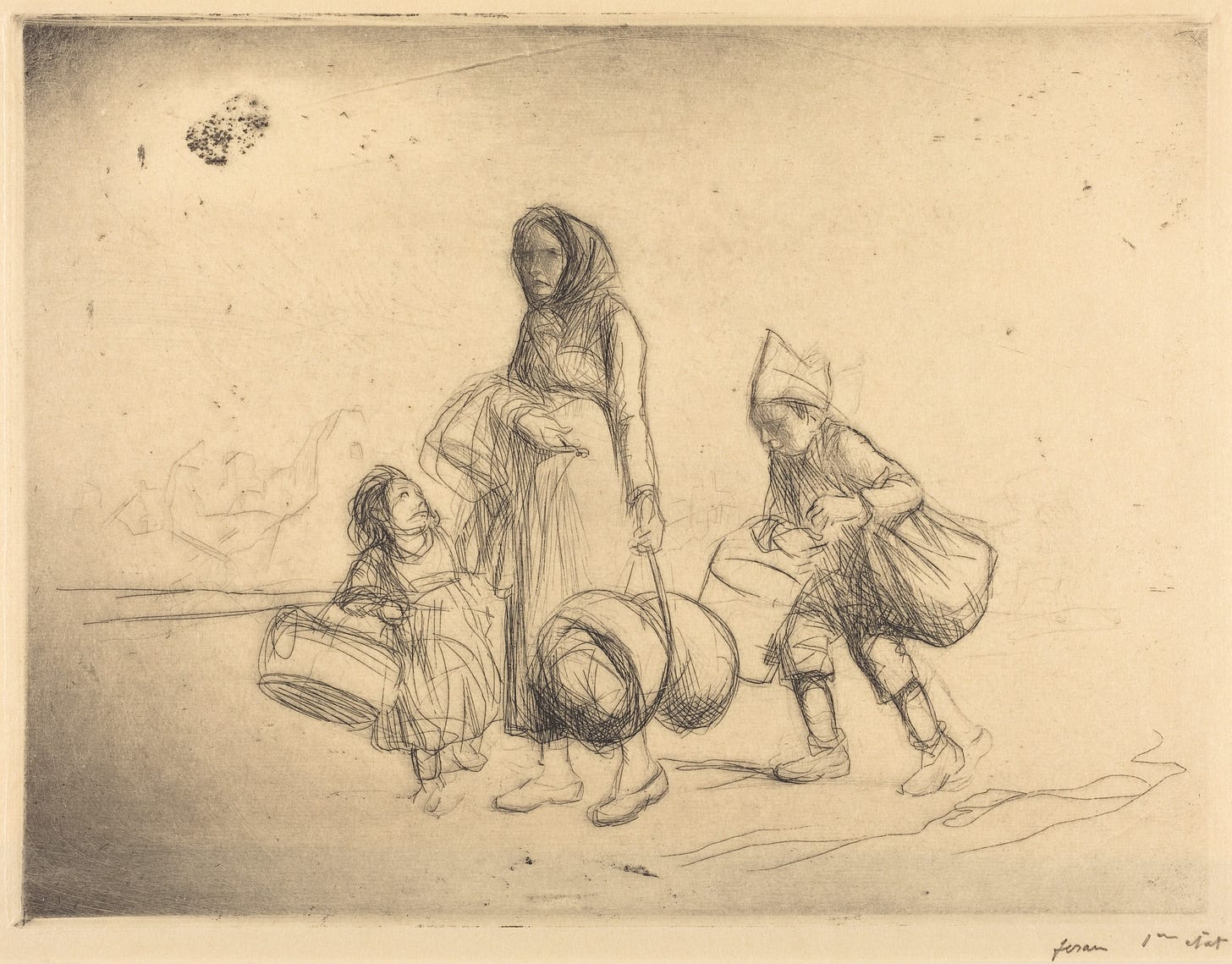[Image: “The Return Home,” Jean-Louis Forain, c. 1915, courtesy of National Gallery of Art, Washington, DC, Rosenwald Collection. In the public domain—and instantly sympathetic to anyone who has ever brought children along on a beach trip or day hike.]
Everyone? Everyone. At least, so Jacques Maritain tells us, and he is someone with whom I would not disagree lightly. And he is not relying on his own experience in this, but on the experience of people who he knows to be more intense and more serious about contemplation than he is himself. I will have to practice a similar reliance in this series, for similar reasons.
Toward the end of his late-in-life book The Peasant of the Garonne, half memoir and half extended meditation on the state of the Church and the world, we find Maritain telling us that he has not done the best job of actually praying in a contemplative way. He admits he might have sometimes presumed that because he could understand contemplation with his intellect, he could also explain it from the point of view of someone who practiced it.
Trying to write about the topic from his own mainly intellectual point of view, though, only revealed to him the depth and the absurdity of that presumption. (“Relatable,” as they say.) So he found himself leaning on the testimony of others—especially his wife Raissa, but also her sister Vera—who were real practitioners. Grounded in what these women taught him, Maritain arrived at a definition of contemplation that might surprise us who have been thinking of contemplation simply as a kind of intense looking, an extension or expansion of ordinary vision.
Rather, he came to see contemplation as an experience encompassing the whole person, a sort of passion:
Pati divina, to suffer things divine, in an inner experience in which the soul does not act but is rather acted upon, acted upon by God under the regime of the gifts of the Holy Spirit.
Let’s unpack Maritain’s definition phrase by phrase.
To suffer things divine… in a devotional context, the sense of suffer instantly links the act of contemplation to participation in Christ’s Passion. Contemplation should not be expected to be easy. This instantly safeguards us against a notion of contemplation that could be practiced in lazy or self-serving ways. Still, suffer bears multiple meanings. It could, but then it might not, mean “undergo pain and displeasure, even to the point of what is severe or egregious.” It may at times only mean “tolerate the imperfections that cannot be avoided in life” or, maybe, just “experience that which I did not first choose to undergo, whether I find the experience desirable or not.”
In an inner experience… although the exterior life might look placid, might even involve real outward privilege, the contemplative is living through a story that is not visible to the unaided eye, and so not receivable within simplistic or reductive material ways of thinking. Bernardo Aparicio once said to me, and I think this is right, that the great literary achievement of St. Teresa of Avila was to narrate this inner experience so that it became the true drama of a life—much more so than any of the exterior happenings through which it was woven. This has (maybe self-evident?) implications for narrative art, but still deeper implications for anyone who wants to live a life of the spirit.
The soul does not act but is rather acted upon by God… Maritain does not want to downplay the role of human agency in all the ways we might choose to prepare ourselves or to cooperate with God’s action. Rather, he wants the emphasis to fall on the role of God, which no human act can control, seize, force, rush, or guide.
Under the regime of the gifts of the Holy Spirit… which is “love, joy, peace, patience, kindness, generosity, faithfulness, self-control” (Gal 5:22-23). Some of us [sheepish hand-raise] are drawn to a kind of religiously tinged catastrophizing, where we concern ourselves with whether or not we would have the strength to face extreme cases, the kind that correspond roughly to O’Connor’s “large and startling figures” or to the outsized lives limned in the Golden Legend. More often than we think, though, God wishes simply to work good things in and through and with us. He schemes to render us capable of goods we had not dared to dream possible. He gives what he asks, and he asks only what he gives. Thinking in terms of “the regime of the gifts of the Holy Spirit” may help to remind us of this.
All this is true even in what Maritain calls “atypical” contemplation, or the prayer “of those who are not contemplatives in the strict sense of the word, souls wholly dedicated to contemplation, but who have nevertheless crossed a certain threshold in the life of the spirit that the contemplatives also cross.”
That is not simplistic, but it is simple. It describes a kind of contemplation that you and I can, possibly, aspire to.
It also leaves us gazing, as we ought to be doing, at mysteries well beyond us and yet at least partially within our grasp: How could passion also be vision? What might it mean to see with our whole being? How can we work at the limits of our own capacity—where we find ourselves unable to do all we desire, even all we, arguably, “should” do—without losing hope, without giving up, without stopping short of the threshold?




